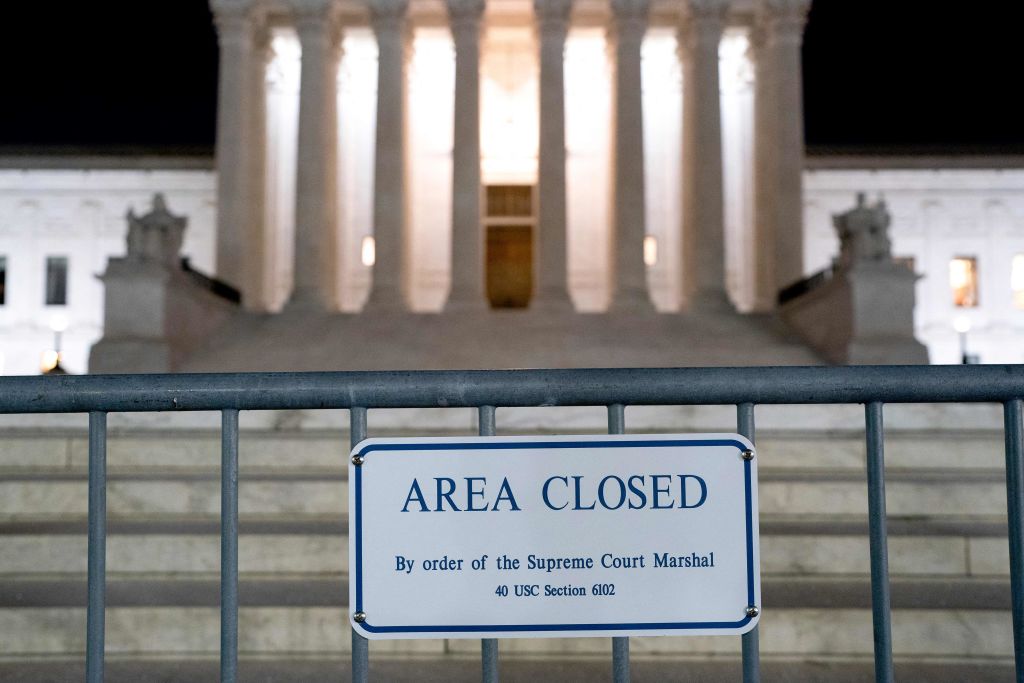Why Poll Claiming Most Americans Don’t Want Biden Nominating A Black Woman To SCOTUS Is So Flawed
Source: STEFANI REYNOLDS / Getty
As the debate over President Biden’s decision to nominate a Black woman to the Supreme Court continues, mainstream outlets point to a new poll from ABC and IPSOS, finding that 76 percent of Americans reject President Biden’s pledge to nominate a Black woman to the Supreme Court. The poll’s framing ignores the value of Black women as qualified individuals.
The Congressional Research Service published a guide for the Supreme Court nomination process describing several considerations presidents generally consider. At no point does it say that a president must consider “all possible nominees.” If that were the case, presidents would be expected to consider those who have opposing political views or are otherwise favored by the other major party. The first consideration acknowledged by the Congressional Research Service is the president’s political interests, and the second is the nominee’s qualifications.
“While the precise criteria used in selecting a Supreme Court nominee vary from President to President, two general motivations appear to underlie the choices of almost every President,” read the guide. “One is the desire to have the nomination serve the President’s political interests (in the partisan and electoral senses of the word “political,” as well as in the public policy sense); the second is to demonstrate that a search was successfully made for a nominee having the highest professional qualifications.”
It also noted that a president could pick a nominee who “will be pleasing to the constituencies upon whom he especially relies for political support or whose support he would like to attract.”
Faced with a similar National dilemma in June 1981, CBS and The New York Times conducted a national survey. The poll asked respondents about their position on then-President Ronald Reagan nominating a woman to the Supreme Court. Reagan promised to nominate the first woman to the Supreme Court on the campaign trail.
Respondents were not asked about “all possible nominees” vs. the first woman. The polling question read:
Ronald Reagan will appoint someone to the Supreme very soon. Do you think he should choose a woman for this position, or choose a man, or doesn’t it make any difference what the sex of the person he nominates is?
The majority of respondents said it didn’t matter. He nominated Sandra Day O’Connor to the bench less than a month later. After Reagan announced O’Connor as his choice, an Associated Press and NBC poll found that 65% of respondents supported her nomination.
Note there is no asterisk by O’Connor’s name in history, as some commentators claim will happen with the future Black woman justice.
Opinion polls can take a temperature check of where the country is on particular issues. Still, polls can contain built-in limitations in the way questions are framed, particularly when it comes to complex topics such as racial or gender equity—framing of the question and the process matters.
A professor who deals with institutional equity tweeted that while a legitimate tool, the poll had a limitation in the framing of the question.
“This is an example of the problematic use of an otherwise legitimate tool, here, polling,” @JohnathanPerk tweeted. “This is asking poll-takers about equality (sameness) with no regard to equity (fairness). Equity dictates informing the respondents that 108 of their 115 SCOTUS justices have been white men.”
This is an example of the problematic use of an otherwise legitimate tool, here, polling. This is asking poll-takers about equality (sameness) with no regard to equity (fairness).
Equity dictates informing the respondents that 108 of their 115 SCOTUS justices have been white men. https://t.co/2zQriLn3EJ
— Jay Perk (@JohnathanPerk) January 30, 2022
At numerous points in modern history, majority opinions were inconsistent with values of equity and justice. Gallup polls during the civil rights movement showed public perception did not favor many moments now regarded as being crucial to equity and justice. A Feb. 1965 Gallup Poll found only 26 percent of Americans polled believed civil rights was an issue. A poll in Nov. 1964 found that 68 percent of those polled believed that implementation of the 1964 Civil Rights Act should happen in moderation.
American presidents never consider the whole pool of “all possible nominees” and always have certain qualifiers and preferences. People who suddenly care about whether a nominee is genuinely representative of the American public somehow never cared that most justices currently on the Supreme Court are Catholics or were raised Catholic, despite Catholics not being a majority in this country.
And it makes you wonder what they think of leaders from mostly Black countries. I mean, I already know, but do they think every one of their leaders is unqualified because they didn’t ship in white people to measure them against?
— Jenn Taylor-Skinner (@JTaylorSkinner) January 30, 2022
The standard of “all possible nominees” is suddenly a concern when the person under consideration is a Black woman. Over 100 white men have been nominated and confirmed without concern for considering “all possible nominees.” Also, the conversation around Supreme Court diversity is part of a broader issue with the American judiciary.
Biden’s pledge to nominate a Black woman as a Supreme Court justice continues his pledge to remake the federal judiciary in the image of America. Making a point to rectify historical inequities in what is often the final arbiter of rights and equal access in society shouldn’t fall to the wayside because Americans do not understand the necessity.
SEE ALSO:
White GOP Senator Thinks Any Black Woman Biden Nominates Is Just An ‘Affirmative Action’ Pick
[ione_media_gallery id=”3835232″ overlay=”true”]

